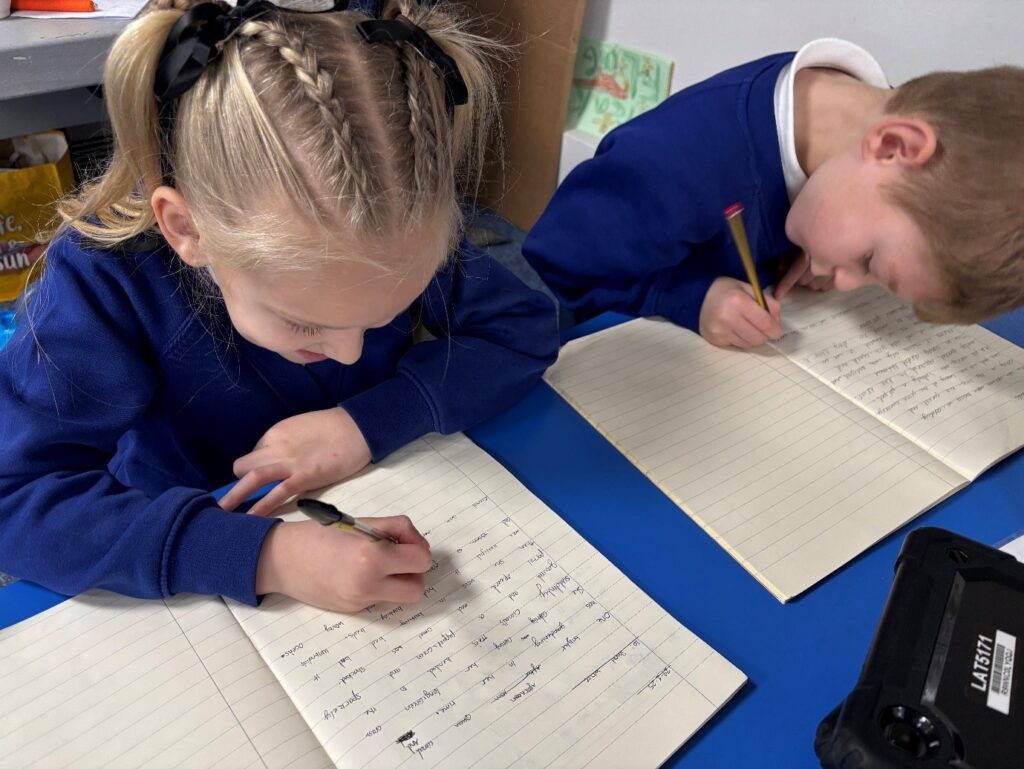Writing

Writing at Wybers Wood Academy
Writing is a fundamental aspect of our curriculum, alongside reading, speaking, and listening. Together, these elements play a crucial role in shaping children into critical thinkers and effective learners. At Wybers Wood Academy, we prioritise the development of writing skills, encouraging children to not only improve their writing but to also enjoy the process of mastering this lifelong skill. Our goal is to create an environment that offers exciting, meaningful, and inspiring contexts for children to grow as writers. This strategy ensures consistency, continuity, and progression in our teaching, providing a clear framework for writing development across the school.
Talk for Writing
At Wybers Wood Academy, we implement the Talk for Writing programme to teach writing across all year groups. Reading is the heart of everything we do, and we believe that a book-rich curriculum enhances both reading and writing abilities. High-quality books and texts serve as the foundation for our writing units. Each writing unit lasts between 2 to 3 weeks, focusing on both fiction and non-fiction writing across various genres. Our units follow a clear structure with three stages:
1. Imitate
In this stage, children immerse themselves in a high-quality model text. They internalise the text, creating actions to help them remember it. They examine the audience, purpose, language, and grammatical features of the text. To deepen understanding, students story-map and “box-up” the text, ensuring they are well-prepared for the next stage.



2. Innovate
During this phase, children begin to generate their own ideas through short burst writing sessions. They work together to create a toolkit of writing rules to guide their work. With teacher support, they then produce a shared piece of writing, incorporating the key features observed in the model text.





3. Independent Application
Finally, children apply the knowledge and skills they have acquired during the unit to create their own independent pieces of writing. Support is provided through working walls and washing lines, which serve as helpful references throughout this process.



Grammar and Punctuation
Grammar and punctuation are integral to our Talk for Writing approach. Throughout the writing units, children have ample opportunities to learn new grammatical concepts while reinforcing previously taught skills. This progression is carefully mapped out in our long-term planning and year group assessment documents to ensure comprehensive coverage. We use text interrogations to identify key grammatical features within model texts, allowing children to understand the purpose and impact of these features on the reader. These insights guide their editing and revision process throughout the unit. To track progress, we use a “Cold Task to Hot Task” assessment model for punctuation and grammar, identifying specific areas for improvement and providing targeted learning experiences through focused interventions.
Vocabulary
Vocabulary is embedded in every part of our curriculum. We make deliberate links between the vocabulary used in reading sessions and in all other areas of our Reading Enhanced Curriculum. During the Talk for Writing process, children are exposed to a broad range of ambitious vocabulary that challenges their thinking and stimulates their creativity. This vocabulary is reinforced through various activities, including oracy-based tasks, VR experiences, OSIE grids, and short burst writing exercises.
Spelling
Spelling is integrated into the Talk for Writing programme, enabling children to apply their spelling knowledge meaningfully. In addition to regular spelling sessions, targeted interventions support children who require extra help. In EYFS and Key Stage 1, spelling is taught through the Read Write Inc. Phonics programme. From Year 2 to Year 6, we use Emile Spelling, an interactive programme that teaches spelling in an engaging and enjoyable way. Each unit begins with a lesson, followed by practice through games and activities on the app. Handwriting practice is also included, reinforcing spelling rules and helping children develop confidence and independence in their spelling abilities.
Handwriting at Wybers Wood Academy
At Wybers Wood Academy, we focus on developing strong handwriting skills from Early Years through to Year 6. Our approach ensures that every child progresses at their own pace, building confidence and fluency in their writing.
Early Years:
In Early Years, children begin by learning the sounds of letters and practicing print formation. We provide early writing support through engaging activities including fine motor exercises, to help children build the muscle memory needed for letter formation. Regular practice ensures they form letters correctly and understand the connection between sounds and writing.



Key Stage 1:
As children in Key Stage 1 become more confident with letter formation, they start practising pre-cursive handwriting, linking letters together to develop a more fluid writing style. We understand that every child progresses at their own pace, so we provide support tailored to individual needs. Some children may be ready to move to cursive writing earlier than others, and we celebrate these milestones.
Key Stage 2:
In Key Stage 2, the focus shifts to refining cursive handwriting. Children work on consistency, fluency, and legibility, building the ability to write quickly and clearly. Regular practice and feedback ensure that every child has the skills needed to write confidently by the end of their primary education.
At Wybers Wood Academy, we are committed to providing targeted support and encouragement, helping each child develop strong handwriting skills at their own pace.